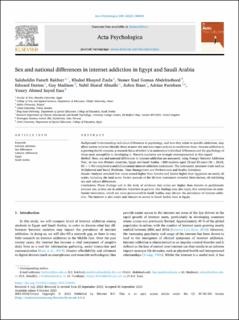| dc.contributor.author | Bakhiet, Salaheldin Fararh | |
| dc.contributor.author | Ziada, Khaled Elsayed | |
| dc.contributor.author | Abdelrasheed, Nasser Siad Gomaa | |
| dc.contributor.author | Dutton, Edward | |
| dc.contributor.author | Madison, Guy | |
| dc.contributor.author | Almalki, Nabil Sharaf | |
| dc.contributor.author | Ihsan, Zohra | |
| dc.contributor.author | Furnham, Adrian | |
| dc.contributor.author | Essa, Yossry Ahmed Sayed | |
| dc.date.accessioned | 2023-10-13T09:23:23Z | |
| dc.date.available | 2023-10-13T09:23:23Z | |
| dc.date.created | 2023-10-10T09:11:37Z | |
| dc.date.issued | 2023 | |
| dc.identifier.citation | Acta Psychologica. 2023, 240 . | en_US |
| dc.identifier.issn | 0001-6918 | |
| dc.identifier.uri | https://hdl.handle.net/11250/3096339 | |
| dc.description.abstract | Background: Understanding individual differences in psychology, and how they relate to specific addictions, may allow society to better identify those at most risk and even enact policies to ameliorate them. Internet addiction is a growing health concern, a research focus of which is to understand individual differences and the psychology of those most susceptible to developing it. Western countries are strongly overrepresented in this regard. Method: Here, sex and national differences in internet addiction are measured, using Young's ‘Internet Addiction Test,’ in two non-Western countries, Egypt and Saudi Arabia. >800 students aged 18 and 35 years (M = 20.65, SD = 1.48) completed a multidimensional internet addiction instrument. The instrument measures traits such as Withdrawal and Social Problems, Time Management and Performance and Reality Substitute. Results: Analyses revealed that males scored higher than females and Saudis higher than Egyptians on nearly all scales, including the total score. Factor analysis of the 20-item instrument revealed three factors, all exhibiting sex and culture differences. Conclusions: These findings add to the body of evidence that males are higher than females in problematic internet use, as they are in addictive behaviors in general. Our findings may also imply that restrictions on male-female interaction, which are more pronounced in Saudi Arabia, may elevate the prevalence of internet addiction. The internet is also easier and cheaper to access in Saudi Arabia than in Egypt. | en_US |
| dc.description.abstract | Sex and national differences in internet addiction in Egypt and Saudi Arabia | en_US |
| dc.language.iso | eng | en_US |
| dc.publisher | Elsevier | en_US |
| dc.rights | Attribution-NonCommercial-NoDerivatives 4.0 Internasjonal | * |
| dc.rights.uri | http://creativecommons.org/licenses/by-nc-nd/4.0/deed.no | * |
| dc.subject | Internet addiction | en_US |
| dc.subject | Sex differences | en_US |
| dc.subject | Cultural differences | en_US |
| dc.subject | Egypt | en_US |
| dc.subject | Saudi Arabia | en_US |
| dc.title | Sex and national differences in internet addiction in Egypt and Saudi Arabia | en_US |
| dc.title.alternative | Sex and national differences in internet addiction in Egypt and Saudi Arabia | en_US |
| dc.type | Peer reviewed | en_US |
| dc.type | Journal article | en_US |
| dc.description.version | publishedVersion | en_US |
| dc.rights.holder | The Authors | en_US |
| dc.source.pagenumber | 9 | en_US |
| dc.source.volume | 240 | en_US |
| dc.source.journal | Acta Psychologica | en_US |
| dc.identifier.doi | 10.1016/j.actpsy.2023.104043 | |
| dc.identifier.cristin | 2183139 | |
| cristin.ispublished | true | |
| cristin.fulltext | original | |
| cristin.qualitycode | 1 | |

